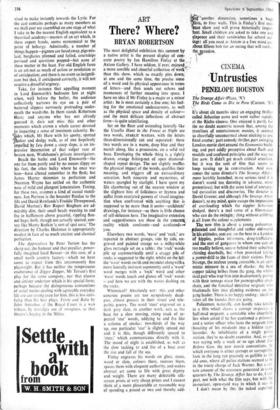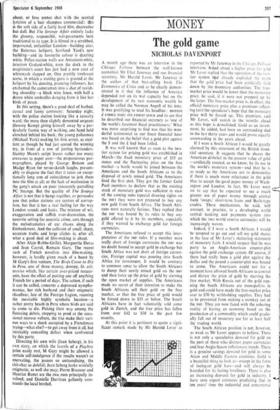The Strange Affair (Plaza, 'X')
CINEMA
Untrusties
PENELOPE HOUSTON
The Birds Come to Die in Peru (Curzon, 'X') It's about six months since an-engaging thriller called Sebastian came and went rather rapidly at the Rialto cinema. One enjoyed it partly for
the no doubt eccentric reason that, among the tramlines of entertainment movies, it seemed
so cheerfully unconcerned about sticking to any
fixed course: part comedy thriller, part swinging Landon movie shot around the Economist build- ing, and part oddly perceptive about flash and muddle and confused principles and the way we live now. It didn't get much critical attention. but it was the sort of film that seems to keep turning up in conversation. And now comes the same director's The Strange Affair: more lavishly launched, more serious (and if it doesn't sound too damning in advance, more pretentious), but with the same kind of unexpec- ted curiosities and discoveries. The director is David Greene; and although The Strange Affair doesn't, to my mind, quite escape the impression of overloading which the nippier Sebastian dodged, there's a real sense of a film-maker who can do the swinging thing without cribbing it, all from the colour supplements.
The new film is about a young policeman. emitted and thoughtful and rather old-world In his attitudes, sent ou: on the beat in a London of hippies, police informers, drug-traffickers. and the sort of gangsters in whom one can all too readily believe, secure behind their suburban chiming doorbells, but when provoked taking a power-drill to the faces of their victims. Peter Strange, the zealous young constable, is an opti- mistic minnow in a sea of sharks: the bent copper taking bribes from the gang, the %N him- sical pair who trap him into inadvertently posing with their teenage niece for pornographic snap- shots, and the fanatical detective sergeant who blackmails him into planting evidence on the gang leader. There is no happy ending : idealism takes all the knocks that are going.
Policemen, naturally, can hardly take kindly to a film which shows a corrupt inspector. a half-mad sergeant, a constable who cheerfully lies when asked if he has cautioned a prisoner, and a senior officer who lures the sergeant into -boasting of his misdeeds into a hidden tape- -iecorder. As inhabitants of a single police station, they're no doubt excessive. And, as One was saying only a week or so ago about The Bofors Gun, the new movie conventions, by which everyone is either corrupt or corruptible, look in the long run precisely as gullible as the old ones, where all police stations seemed to be in the trusty charge of Jack Warner. But a cer- tain amount of the crossness generated in some quarters by The Strange Affair has to do, I su, pect, not with what the film says, but with the insouciant, open-eyed way in which it say, it.
I don't mean by this the naked caperings about, or love scenes shot with the scented lyricism of a hair shampoo commercial: this is the soft side of a fairly hard film, decorative but dull. But The Strange Affair entirely lacks the gloomy, responsible, wet-pavements look traditional to its type. It is filmed in a scrubbed, impersonal, unfamiliar London—building sites, the Battersea heliport, Scotland Yard's new building—and its favourite colour is dazzling white. Police-station walls are Antonioni-white, interiors Godard-white, even the dock in the magistrate's court has just had a new coat of whitewash slapped on. One prettily irrelevant scene, in which a visiting guru is greeted at the heliport by his dancing, prancing followers, has enchanted the cameraman into a shot of ravish- ing absurdity—a bleak wire fence, with half a dozen white umbrellas danging from it like lost birds of peace.
In this setting, there's a good deal of barbed, casual and funny comment: Saturday night, with the police station looking like a casualty ward; the more than slightly demented sergeant (Jeremy Kemp) giving himself away by a par- ticularly frantic way of walking, one hand held clenched behind his back; the young policeman (Michael York) making his first arrest, as exul- tant as though he had just scored the winning try, in front of a row of jeering bystanders. Stanley Mann's script leaves rather too many crevasses to paper over—the preposterous por- nographers, played by George Benson and Madge Ryan for revue-sketch laughs, presum- ably to disguise the fact that it takes an excep- tionally long arm of coincidence to jerk them into the film at all; or the lack of motivation in the gang's attack on poor innocently patrolling PC Strange. But the quality of The Strange Affair is not that it hangs together, or persuades you that police stations are centres of corrup- tion, but that it has a real feeling for the way London sounds and looks. The mixture of wit, exaggeration and raffish over-decoration, the neurotic setting for neurotic crime, cuts through the melodramatics of car chases along the Embankment. And the collision of small, sharp, accurate truths and large clichés is, after all, what a good deal of film-making is about.
After Alain Robbe-Grillet, Marguerite Duras and Jean Cayrol, Romain Gary. The recent rush of French novelists into film-making, however, is hardly given much of a boost by M Gary's first venture, The Birds Come to Die in Peru, one of those moony, droopy, lit. crit.
movies which, like certain over-priced restaur- ants, have the effect of putting one off anything French for a period of days. The action, if such it can be called, concerns a depressed nympho- maniac, her rich husband and their enigmatic chauffeur, late of the Foreign Legion, roaming the inevitable highly symbolic location—a rather pretty beach in Peru where birds are said to come to die. Picking their way among the fluttering debris, stopping to prod at the occa- sional morose vulture, the trio make their vari- ous ways to a shack occupied by a Frenchman trying—what else?—to get away from it all, but inevitably conceding defeat when confronted by this party.
Directing his own wife (Jean Seberg), in his own story, on which the laurels of a Playboy Prize easily rest, M Gary might be allowed a certain self-indulgence if the results weren't so enervating, the pauses so untransfixing, the chit-chat so doleful; Jean Seberg looks wistfully enigmatic, as well she may; Pierre Brasseur and Maurice Ronet are the two men principally in- volved; and Danielle Darrieux gallantly com- mands the local brothel.







































 Previous page
Previous page